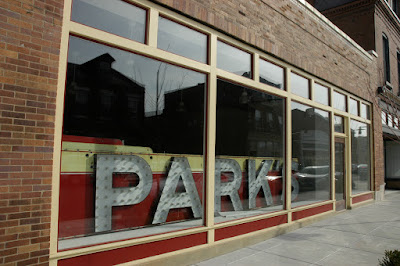The 2000 census data counted 2,956 residents (down 32% from 1990...yikes) of whom 94% were black, 4% white, 1% Hispanic/Latino. There were 1,342 housing units, 69% occupied by 46%/54% owner/renter. You get the picture, major losses of residents, 31% of the housing units unoccupied.
The name College Hill was given to this area because it was the location of the St. Louis University College Farm. This area was acquired by the University for garden and recreation purposes in 1836, it was subdivided in the early 1870's. Source
College Hill's claim to fame is probably the 2 water towers that grace the neighborhood.
The Bissell Point plant included a standpipe, which is the present Old Water Tower at 20th Street and East Grand Avenue, and the reservoir at Compton Hill. The tower on East Grand was placed in service in 1871. It was considered to be the largest perfect Corinthian column in existence, reaching a height of 154 feet. It was designed by George Gingham Barnett, the first architect to receive training abroad. In the late 1920's lights were placed on top of the Corinthian tower to serve as aviation beacons. They were extinguished in World War II as a security precaution and were reactivated in 1949 to guide flyers to Lambert Field. The lights are presently not in use and the tower itself has not been used for its original purpose for many years.Here is the 1887 "Red Water Tower" at Bissell and Blair:
Another familiar landmark in this area is the so-called Red Water Tower at Bissell Street and Blair Avenue. This structure was erected as a stand pipe to augment the "Old Water Tower" on East Grand Avenue. It would counter the water surge from high service pumps at Bissell Point. It was built in 1887 at a cost of $79,789 after a design by architect W.S. Eames, who was then the assistant city water commissioner. The 206 foot high tower was created when new high service pumps were installed in the water works at Bissell Point.
After Bissell Point plant was retired from service in 1960 its site was sold and subsequently became the location of the Metropolitan Sewer District's north sewage treatment plant, which began operations in 1970. A portion of the site is occupied by a city incinerator and garage.
The two north side water towers, as well as the one at Compton Hill, have been declared to be local and national land marks and represent nearly half of all such surviving structures in the nation. Admirers of the north side towers have successfully resisted action to raze them and some funds are reported to be available for their restoration. In 1997 the Gateway Foundation had lighting added to the towers to light them at night. The effect has been stunning. The towers are now visible at night from the interstates and from many vantage points in their respective neighborhoods. Source
The properties that are still standing around the water tower are St. Louis classics.
Here's the Old Water Tower at Grand and 20th Street:
Overall, College Hill has huge potential, as it has a nice mix of all styles of architecture that old St. Louis has to offer. It has of course seen better days and much of the neighborhood is crumbling; but it's not a hopeless place at all. There is still enough of the backbone to make this a contiguous neighborhood with a lot of future potential.
College Hill is clearly another neighborhood lying in wait for those with the ideas, resources and desire to make change and bring this place back to it's original glory. College Hill with some TLC could easily add to St. Louis' resume as one of the, if not THE brick city of the universe.
Here's what I mean, check out these aging beauties:
Many structures are falling:
Many are boarded up, or not:
There are several commercial corridors and former businesses, mainly along Grand and Florissant:
College Hill's proximity to ONSL, its history and amazing architecture make it an area worth investing in. So get in now, the price and time is right.

































































